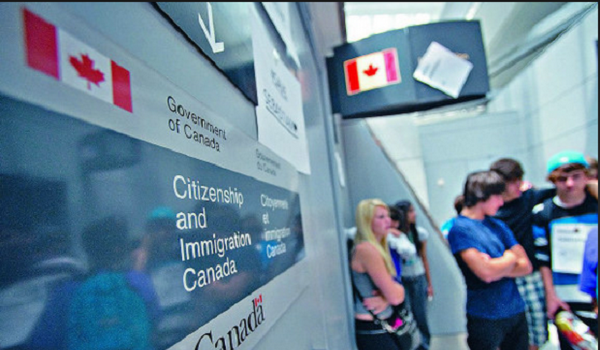Immigration support in Canada drops to lowest in decades
Canadians haven’t felt this strongly opposed to immigration levels in a quarter century, a turnaround of attitude in a country that once embraced newcomers but has been shaken by a post-pandemic influx.
Nearly six in 10 people now agree “there’s too much immigration to Canada,” according to the country’s longest-running survey on the topic by the Environics Institute. It’s the first time since 1998 that this view is held by a clear majority, and a stark shift from favorable opinion over the past two decades.
The poll reflects further erosion of public support for immigration, with the proportion of Canadians opposing the volume of new arrivals surging for the second straight year. With a 31 percentage-point jump since 2022, it’s the most rapid change over a two-year period since the survey began in 1977.
Record population growth — comparable to adding all of San Diego’s residents to a country that’s slightly more populous than California in just over 12 months — exacerbated housing shortages, inflated rent prices, strained public services and pushed up the unemployment rate. These pressures threatened a long-held belief that mass immigration gives Canada an edge in a global race to replace aging workers.
Facing growing criticisms for losing control of immigration, Prime Minister Justin Trudeau’s government has put a limit on international student intakes, restricted use of foreign labor and set a goal to drastically shrink the temporary resident population. But the survey results suggest the efforts so far have failed to reverse the sharp decline in immigration support that began last year.
“The increase in immigration is accompanied at a time when people are feeling less comfortable with their own financial situation,” Keith Neuman, the author of the Environics report, said in an interview. “And the fact that you have an unpopular government responsible for an issue that people are becoming more nervous about simply reduces confidence. That combination of factors isn’t something we’ve really seen before.”
Poorly Managed
Rising agreement with the view that immigration levels are too high can be observed across Canadian provinces, generational cohorts and key federal political party lines. The most common reasons cited by Canadians who think there’s too much immigration include concerns over housing, a weak economy, overpopulation and poor management by the government.
Public support for immigration in Canada has been largely rooted in the notion that it boosts the country’s economy. But that conviction has weakened, the survey showed. Fewer than seven in 10 Canadians now think immigration has a positive impact on the economy, a second consecutive annual drop and a decrease from more than 80% two years ago.
“Canadians haven’t turned against immigration wholeheartedly. It’s not as if the whole country has shifted to an anti-immigrant perspective the way it’s happening in some other countries,” Neuman said. “The major shift is really about the management of the system, the numbers and the perceived capacity of the country to absorb them without being too disruptive.”
Trudeau’s Liberal government will announce new immigration levels by Nov. 1. After years of raising or maintaining admission numbers, Immigration Minister Marc Miller has said the government may consider reducing annual permanent resident targets while also setting limits for temporary immigrants, which include students, foreign workers and asylum claimants.
The Environics survey is based on telephone interviews conducted in September with more than 2,000 Canadians ages 18 and above. It’s considered accurate within 2.2 percentage points in 19 out of 20 samples.
This article was first reported by BNN Bloomberg











